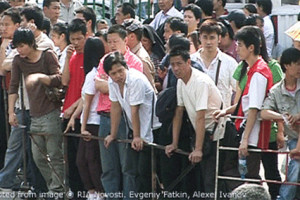JRL NEWSWATCH: “Russian pundit says migration policy needs to be ‘more open'” – Izvestia/Sergei Ryazantsev

In Izvestia, Sergei Ryazantsev argues:
“… The United Nations rates [Russia] third after the United States and Germany in terms of number of immigrants. … in 2015 … the US population born overseas amounted to 46.6m; 12m went to Germany, 11.6m to Russia. Uzbeks, Tajiks, Kyrgyz, Armenians, Azerbaijanis, and representatives of other republics of the former USSR began to come to Russia aggressively as of the start of the 2000s. Many began to acquire Russian citizenship. Approximately 2.2m newcomers became Russian citizens from 2001 through 2017. The leaders among the recipients of citizenship in 2017 were persons from Ukraine (85,100), Kazakhstan (40,700), Tajikistan (29,000), Armenia (25,100), and Uzbekistan (23,300).”
The author addresses demographics, geographic sprawl and the need for labor:
“Russia occupies one-sixth of dry land and is the biggest country in the world in terms of area. Approximately 146m persons, which corresponds to ninth place in the world, live on this vast territory …. [T]he population of Russia is half that of the United States. Population density in many regions is extremely low. The absence of people and the shortage of labour resources are becoming increasingly palpable and are impeding socioeconomic development. … [T]he territory of Russia, even considering the difficulties of habitation in areas of the North and equivalent territories, could accommodate no fewer than 500m persons. …”
However, the author suggests, Russia is in competition with other destinations for migrants.
The author addresses various aspects of migration issues, as well as foreign students, and argues in favor of robust progress on migration.
“… Russia’s transition to an active position in the shaping of the migration traffic essential for the country’s socioeconomic and demographic development, could be a breakthrough … the building of a new model of migration policy based not only on work with the newcomers within the country but also active work with potential citizens of Russia outside. A change in the approaches to migration management from control and administration to socioeconomic would enable Russia to accomplish a spurt in humanitarian, demographic, and socioeconomic development.”
The author contrasts Russia’s migration potential and risks with scenarios faced by Europe.
“The socio-cultural risks which migration contains for Russia are not as yet that significant … distinct from the risks to the European countries … the socio-demographic structure and motivation of those coming to Russia and Europe are fundamentally different. The immigrants oriented towards Russia … are prepared to work, want to learn, and may be integrated comparatively easily into the host society. … Russia should take advantage of this opportunity.”
[no direct link to English-language version available]
[featured image is file photo]
